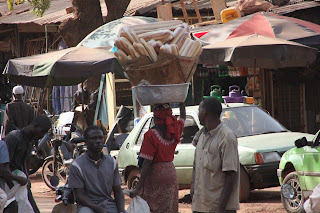The Kingdom of heaven is like a mustard seed, or like yeast…like a treasure hidden in a field, a merchant in search of fine pearls, or a net thrown into the sea, catching fish of every kind…
On several mornings, Learning Tour leader Norm Dyck offered small tidbits of these Kingdom parables, inviting us to consider what insights they inspire.
The Kingdom of heaven seems to be found in small and seemingly insignificant places, but within each lays the capacity for something far greater. And maybe we don’t focus enough on the small things, or the tiny seeds we plant through our everyday activities and the way we choose to live. Maybe we don’t always recognize the seeds that are planted in us.
I like to think we planted seeds of encouragement among our brothers and sisters in Burkina by travelling such a great distance to visit; everywhere we went we sensed an appreciation for our efforts. Somehow, though, I suspect being in Burkina planted just as many Kingdom seeds in us.
Each morning before the first rooster crowed in Ouagadougou (and yes; there are roosters in this city of 2 million people, and chickens, and donkeys and goats…), the call to prayer or adhan rose from a nearby mosque. Allah is the greatest. I testify there is no other God except for Allah…
It was one of five calls-to-prayer daily although, admittedly, I was so caught up in my activities that I rarely noticed the others. The early morning adhan quickly slipped under my skin. Although I couldn’t determine whether the words were chanted in Arabic or French, they reminded me of God’s presence and created a kind of longing in my soul for the intimacy of prayer.
It was also a solemn reminder that although the world has generated a culture of fear around Islam and some interpretations of the Koran (seems to me that some interpretations of the Bible generate a culture of fear too) those who practice it are indeed devout. Prayer is a publicly prescribed part of their lives. Perhaps some Muslims pray because they are expected to, but I suspect spending a couple of hours a day on one’s knees will eventually create a connection with our Creator.
The call to prayer and thoughts of Islam remind me once again of Othniel’s sermon and his question; did Christ come only for Christians?
Doesn’t God speak to us all, regardless of our beliefs, wherever we may be standing? Or kneeling.






